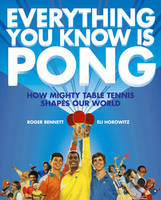


|
|
| book details |
Everything You Know Is Pong: How Mighty Table Tennis Shapes Our World
By (author) Roger Bennett, By (author) Eli Horowitz

|
This book is currently unavailable. Enquire to check if we can source a used copy
|
| book description |
Every sport claims to be the world's game-soccer, basketball, kabadi. But few can match the global status acquired by modest yet ubiquitous ping pong: constant but never ascendant, willing to be considered a little ridiculous, all the while secreting its fingerprints across popular culture. Fidel Castro and Prince Charles, Thelonius Monk and 50 Cent, George Foreman and Arnold Schwarzenegger, Charlie Chaplin and Ellen Degeneres - all have clutched a paddle, all have peered across that net with menacing intent. If you throw in a billion Chinese aficionados, it is no empty boast to claim that ping pong is the most popular yet little exposed pastime in the world today. A beautifully illustrated, unabashed love letter to ping pong, Everything You Know is Pong tells the little-known story of this almighty subculture. With essays from such paddle-weilding luminaries as Jonathan Safran Foer, Nick Hornby, Harry Evans, Davy Rothbart, and Will Shortz, and using images as diverse as 1960s Dr. Pepper advertisements, Chinese telephone cards, and primitive video game consoles, this book is nothing less than a coronation of ping pong, the sleeping giant of fast-paced fun.
| product details |
Normally shipped |
Publisher | HarperCollins Publishers Inc
Published date | 1 Nov 2010
Language |
Format | Hardback
Pages | 272
Dimensions | 232 x 187 x 16mm (L x W x H)
Weight | 932g
ISBN | 978-0-0616-9051-8
Readership Age |
BISAC | sports & recreation / table tennis
| other options |
|
|
|
To view the items in your trolley please sign in.
| sign in |
|
|
|
| specials |
|
|
Look around you is anything real or normal any more? News, images and videos created by AI are everywhere.
|
This first comprehensive biography of Cecil Rhodes in a generation illuminates Rhodes’s vision for the expansion of imperialism in southern Africa, connecting politics and industry to internal development, and examines how this fueled a lasting, white-dominated colonial society.
|
|
|
|
|